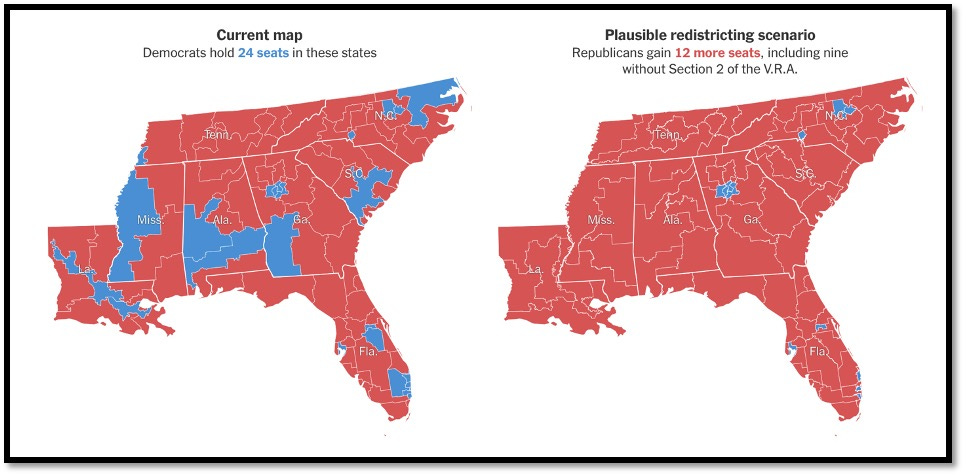The Massive Impact of Eliminating Racially Drawn Congressional Districts
How drastically will this change the power struggle in the U.S. House for the foreseeable future?
Before the NFL was unwatchable, I enjoyed watching Peyton Manning quarterback the Colts. Peyton had the size and a solid arm, but what truly set him apart was the engine in between his ears. He assessed the line of scrimmage and the pass coverage at an unparalleled level and quite often no one, the Colts included, had any idea what play would be run until Manning himself called it at the line.
So it is when people ask me about my 2026 U.S. House forecast. By now, you probably understand the headwinds blow strongly against the President’s party, which has lost net seats in 20 of 23 midterms since 1934. With retiring Republicans giving way to vacant seats and many incumbents far less popular than President Trump in their own districts, a static map makes it much more likely that Democrats can flip three seats and take the majority. The average loss for the President’s party since 1934 is 27 seats. The good news for Republicans is that, combined with the obvious party registration trends, the maps are anything but static. GOP states, led by Texas, are going to pick up net seats even if Gavin Newsom rams his haphazard California redistricting plan through the courts. This week, North Carolina Republicans announced a new map that state law prevents even the Democrat governor from vetoing, which would eliminate Don Davis in NC-1.
The biggest midterm-related news, underscoring why I don’t see the point in predicting specific house races until we get to the line of scrimmage during early voting next year, came with this week’s updates on Louisiana v. Callais, which is at the U.S. Supreme Court. Here is what NPR had to say:
A major redistricting case returning to the U.S. Supreme Court on Wednesday could not only determine the fate of the federal Voting Rights Act, but also unlock a path for Republicans to pick up a slew of additional congressional seats.
If the high court overturns the act’s Section 2 — a provision that bans racial discrimination in voting — GOP-controlled states could redraw at least 19 more voting districts for the House of Representatives in favor of Republicans, according to a recent report by the voting rights advocacy groups Black Voters Matter Fund and Fair Fight Action.
A frustrated Justice Ketanji Brown Jackson, a highly questionable Biden legacy in our highest court, wound up calling minorities “disabled” during oral arguments this week, which signaled a very real possibility the court will strike down requirements for legislatures to draw districts with race at the forefront of consideration. Remember, readers, fairness only matters in redistricting when Republicans are in charge. Take a look at New England:
21 U.S. House seats and not a single Republican? No issue there; California, with 43 Democrat seats and 9 Republican seats, has a more lopsided share than Texas, with 28 Republicans to 13 Democrats, and this stands to get worse in favor of California even if both dominant parties make expected gains from redistricting. So, in this captain’s opinion, to hell with fair districts.
Republicans need to win this round and then, as is likely, someone will intervene and mandate fair districting across the board nationwide. Nevertheless, if the Supreme Court guts Section 2 of the Voting Rights Act, there will be major ramifications for Congressional elections. It is serious enough that The New York Times has already sounded the alarm:
Timing, if the decision to gut Section 2 is made, is everything. I am not confident this sweeping change would occur in time for the 2026 midterms given all the filing deadlines, ongoing campaigns, and other details holding back large overhauls like this one. It would most certainly be in play by 2028, when the nation will return to full turnout levels, making upsets less common. For now, I’ll review the map of the 24 Democrat-held House seats in eight southern states (Florida, Georgia, South Carolina, North Carolina, Tennessee, Alabama, Mississippi, and Louisiana) and assess the likelihood of them being turned red:
12 Democrat Seats to Remain
I concur with the New York Times that the twelve seats on the right of the graphic will remain in Democrat hands. These are what I call vote dumps, which are drawn in by Republican legislatures to contain as many Democrat votes as possible. Think of it like a quarantine (a real one, not a COVID-19 detention of healthy people), in which North Carolina realizes it has a political disease, such as Raleigh, that will contaminate healthy parts of the states if it isn’t quarantined. They create the district knowing it can’t be won by Republicans and draw as much of the blue into it as possible. They realize the blue virus doesn’t travel far, thereby having a narrow infection radius by quality of spread, and can often manage the symptoms for a decade or more before reassessing for urban growth. Austin is masterfully carved out of political maps in Texas under the guidelines above. So, Democrats will continue to manage fiefdoms in metro Atlanta, which the Georgia GOP refuses to even minimally contest, Charlotte, Raleigh-Durham, Tampa, Orlando, and the most poverty-stricken, non-English speaking districts of South Florida.
SEATS THAT WILL FLIP
Louisiana (2)
LA-2: D+46.7% margin in 2024 and currently a vote dump for New Orleans held by Troy Carter. Surrounded by LA-1 (Scalise, R+42.8%), LA-3 (Higgins, R+51.9%), and LA-5 (Letlow, R+37.0%). Enter Republican Representative from New Orleans, something you never thought you’d hear.






